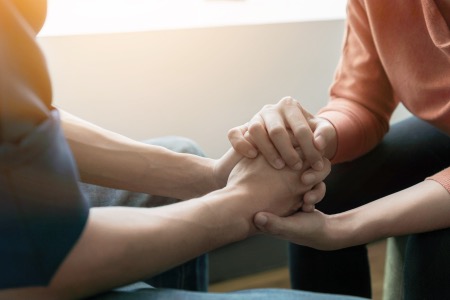Prescription Salvia Addiction Treatment & Rehab
Salvia is a strong hallucinogen that is also physically powerful, when smoked, the effects may be felt within seconds. As a dissociative drug, Salvia is appealing as an escape from reality, unfortunately, this doesn’t solve the underlying mental issues driving your addiction.
Receiving treatment for addiction through a reputable rehabilitation centre will help you address these issues and begin a life of sobriety.
Understanding Salvia Addiction
Addiction is never chosen, you probably started using salvia voluntarily, however, addiction is a disease marked by the chronic desire to use a substance beyond control and despite the negative consequences you may experience.
Salvia as a substance isn’t considered addictive, but the effects on your mind and body may be so appealing that you have found it impossible to quit using it, so although rare, psychological addiction can occur. (Salvia)

Recognising the Signs of Salvia Use
Salvia induces:
- intense vivid, colourful and often bizarre, dream- or film-like hallucinations
- loss of control over physical movements (incapacitation)
- uncontrollable laughter
These ‘trips’, especially at higher doses, can be frightening and can cause serious psychotic disturbances that can last for hours after the hallucinations have disappeared.
Common after-effects include:
- tiredness
- dizziness
- amnesia
Vulnerable people may experience lasting psychosis https://www.emcdda.europa.eu/publications/drug-profiles/salvia_en
Why Salvia Addiction Treatment is Important
Addiction affects all aspects of your life, you may have noticed that you or someone you love is experiencing:
- declining grades or difficulty at school
- poor performance at work
- relationship difficulties, often involving lashing out at loved ones who identify the addiction
- an inability to stop using Salvia even though it may be causing health problems (breathing issues), mental health problems (increased depression, anxiety and even psychotic episodes), personal problems (such as issues with employment or relationships)
- a noticeable lack of energy in daily activities
- profound changes in appearance, including weight loss and a noticeable abandonment of hygiene
- appearing defensive when asked about Salvia use
Some of these effects can be long-term and the sooner you or your loved one receives treatment the better.
Treat the Addiction, not the Salvia!
Addiction is classified as a mental health illness (Diagnostic and Statistical Manual of Mental Disorders (DSM-5)) characterised by the chronic urge to keep using the substance in question (Salvia). You may think that if you can rid your body of Salvia (detox) that you will be starting with a clean slate and will now be ‘cured’.
Addiction is a complex disease that is facilitated by your environment, genetics, socio-economic status and trauma, to name a few, and without addressing and finding ways to either solve or cope with the causes, your risk of relapse increases. (Drug Abuse & Addiction: Effects on Brain, Risk Factors, Signs)
A holistic treatment including behavioural therapies are the most beneficial in the long term recovery of people suffering from addiction, and although treatment for Salvia addiction is still in the early stages if you can follow an evidence-based treatment programme you will have a better chance at a life free from Salvia addiction.
Enter your phone number below and one of our qualified addiction specialists will get in touch to discuss your options.
How does Residential Rehab Work for Prescription Salvias?

A residential rehabilitation centre is generally private and offers a safe and compassionate environment in which to explore not just your addiction, but the causes beneath the surface and provides you with the tools to build a solid foundation for sobriety.
If you are concerned about your use of Salvia, you can contact your GP who will be able to assess and diagnose your addiction. From there you may be referred to a rehabilitation centre for primary addiction treatment which is normally 28 days.
You are in control of your treatment options and can attend a facility of your choosing, our team is happy to assist you with finding the best fit.
Medical Assessment
On arrival at the residential rehabilitation treatment centre, you will undergo a medical assessment, this will form the base from where your personalised treatment programme is built. This assessment is used to gather information on:
- Current medical issues
- Previous history of addictions or concurrent drug use (poly-drug)
- Existing mental health issues (dual-diagnosis)
Detox
Easing your body and mind through the withdrawal process may produce uncomfortable symptoms which may require a medically supervised detox to monitor and ease these symptoms. A detox precedes the rehabilitation process to give you a stable and focused mindset to continue with your treatment. Not much is known at this point as to what are the common Salvia withdrawal symptoms but addiction as a whole comes with a range of withdrawal symptoms that can be eased within a private rehabilitation programme.

Rehabilitative Therapy
The use of Salvia as ‘safe’ and its fairly ‘non-addictive status has made it popular, unfortunately, this has meant limited studies on treatments that could be effective is relatively unknown, and at this time, there are no pills, patches, or inhalers approved to treat Salvia addiction.
Therapy is one of the best evidence-based ways to overcome any addiction. Therapists can treat your Salvia addiction in the following ways:
- Motivational enhancement therapy teaches you self-motivation techniques to quickly stop using Salvia
- Cognitive-behavioural therapy (Cognitive Behavioral Therapy (CBT): Definition, Types, Techniques, Efficiency), or “talk therapy,” encourages you to change how you think so you stop using Salvia and gain the self-control needed to fight the urge to use Salvia.
- Rational emotive behaviour therapy (REBT) – identifies irrational beliefs, actively challenges these beliefs, and teaches you to recognise and change these thought patterns. (Different approaches to psychotherapy)
- Contingency management is another type of therapy in which you set goals and earn rewards for staying drug-free. It also removes rewards if you suddenly relapse.
Aftercare & Family Support
Aftercare, also known as secondary treatment, is available either as a resident in an addiction treatment centre or as an outpatient option via individual sessions. It will assist you, or your loved one, with reintegration back into everyday life, employment and relationships.
Continued therapy helps to address any further underlying issues which may be present or appear after the completion of the formal treatment programme.
Support Groups are Useful
Rehabilitation is only the first phase of your recovery and healing from addiction, having long-term involvement in therapy and with support groups such as:
- Involve your family in your therapy, and give them options to join support groups that are dedicated to helping families, friends and loved ones of addicts:
- Adfam (Useful organisations)
- Families Anonymous (Famanon)
- SMART recovery UK (Self-Help Addiction Recovery | UK Smart Recovery) will be able to assist you through their 4 point programme.
Choosing a Treatment Centre
Very little is known about the withdrawal and treatment of Salvia addiction beyond traditional addiction treatments, as such a well-rounded programme offered by a private rehabilitation facility that best suits you and can support your treatment will keep you invested in your recovery,
Some factors to consider:
- Where are they located? Being away from your environment may be more beneficial with
less temptation - Do they have a decent CQC rating? All residential treatment centres in the UK are regulated by the Care Quality Commission (What we do | Care Quality Commission), the independent regulator of health and social care in England.
- Is the treatment team credible, certified and experienced in dealing with addiction especially hallucinogenic addictions?
- Does the centre offer a treatment program that you like? different treatment centres utilise different therapeutic models:
– 12 Step Model -A spiritual abstinence-based programme that focuses on your motivation to change your addictive behaviours within the treatment and recovery process. (The 12 Steps of Recovery Programs)
– Non 12 Step Model – Focus is on addiction’s multifaceted issues and offers a treatment programme that includes both physical and psychological therapy. - Medical – Does the treatment centre offer medical assistance to aid your recovery? Can the centre provide medication to assist with your withdrawal?
There is a wide range of treatment facilities available throughout the UK and we can assist in finding the best fit for you.
The Benefits of Private Rehab
- Fast admission
- A flexible, adjustable treatment plan
- Confidentiality and a team of specialists you can trust
- Multiple treatment methods taking place on one site
- Additional therapies offered – Art, Exercise etc
- Visiting/phone call times with family
- Access to continual support from a range of professional therapists, time to build trust and an ongoing therapeutic relationship
- Aftercare programmes to support your recovery beyond your stay
Paying for Treatment
Private rehabilitation centres are generally paid for by the client, some offer a payment plan where the final payment is made on discharge.
In some cases, clients have received funding from benefactors, charity groups or their families.
Free Outpatient Services
The NHS (The NHS website – NHS) only offers outpatient care for the treatment of addiction and there can be waiting lists before you may start treatment in your area (Find Drug addiction services), so if you require urgent admission, contact us and we will help you find the right private treatment centre for your needs.
In cases where your withdrawal is very uncomfortable, free outpatient services may not be able to assist with your detox as closely as you can expect from private rehab centres and the medical assistance may not be as focused as you need.
Advice on Quitting Salvia
Ensuring that your home is free of any Salvia paraphernalia (Vapes, packets, liquid, leaves etc), try to stay away from the environments, shops and ‘friends’ that you may have purchased or used Salvia with in the past. Incorporate a new healthy lifestyle into your life and concentrate on the new skills, hobbies and interests you have learnt in rehab to help keep your focus on sobriety and recovery. Continued therapy, support, compassion and re-affirmation of your commitment to staying free from Salvia, makes long-term recovery possible.
